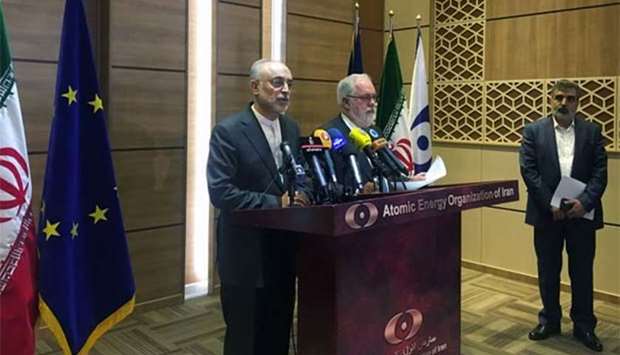The European Union's energy chief tried to reassure Iran on Saturday that the bloc remained committed to salvaging a nuclear deal with Tehran despite US President Donald Trump's decision to exit the accord and reimpose sanctions.
The European Commissioner for Energy and Climate, Miguel Arias Canete, delivered the message during a visit to Tehran and also said the 28-nation EU, once the biggest importer of Iranian oil, hoped to boost trade with Iran.
"We have sent a message to our Iranian friends that as long as they are sticking to the (nuclear) agreement the Europeans will... fulfil their commitment. And they said the same thing on the other side," Canete told a news conference.The European Commissioner for Energy and Climate, Miguel Arias Canete, delivered the message during a visit to Tehran and also said the 28-nation EU, once the biggest importer of Iranian oil, hoped to boost trade with Iran.
"We will try to intensify our flows of trade that have been very positive for the Iranian economy."
Iran's nuclear chief Ali Akbar Salehi said his country hoped the EU would manage to salvage the 2015 deal, in which Tehran agreed to curb its nuclear programme in return for the lifting of most Western sanctions.
"We hope their efforts materialise ... America's actions ... show that it is not a trustworthy country in international dealings," Salehi told the joint news conference in Tehran.
Since Trump's announcement on May 8 about the US exit, European countries have said they will try to keep Iran’s oil and investment flowing, but have also admitted they will struggle to provide the guarantees Tehran seeks.
'All kinds of possibilities'
Salehi said Iran had several options, including resuming its 20% uranium enrichment, if the European countries failed to keep the pact alive. He said the EU had only a few weeks to deliver on their promises.
"If the other side keeps itself committed to its promises we also will be keeping ourselves to our promises ... We hope the situation will not arise to the point that we will have to go back to the worst option," Salehi told reporters in English.
"There are all kind of possibilities, we can ... start the 20% enrichment."
Under the 2015 deal, Iran’s level of enrichment must remain at around 3.6%. Iran stopped producing 20% enriched uranium and gave up the majority of its stockpile as part of the agreement.
Uranium refined to 20% fissile purity is well beyond the 5% normally required to fuel civilian nuclear power plants, although still well short of the highly enriched, or 80 to 90%, purity needed for a nuclear bomb.

